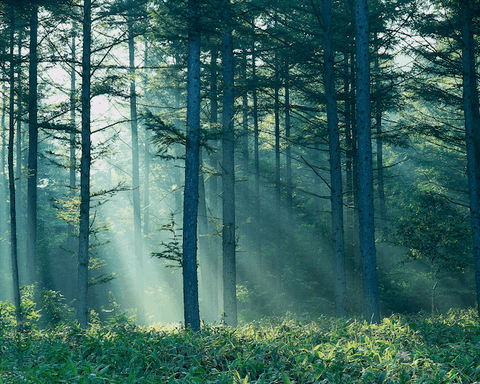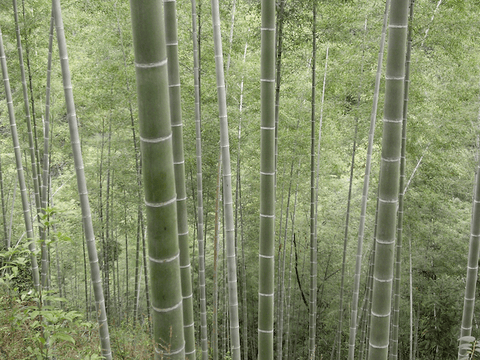The Forest Stewardship Council® gives the most respected certification for forest-derived products. Here’s what their certification is all about, and how it can help you find bamboo that’s as green as it seems.
These days, there is a myriad of certifications to sift through. And it can be hard to know what’s legitimate and what’s greenwashing. So today, we’re breaking down the details about “FSC®-certified” products. Specifically, FSC-certified bamboo.
What Does Being FSC Certified Mean?
The Forest Stewardship Council® (FSC®) is an independent, non-profit organization. Their goal is to protect forests for future generations. They do so by setting standards for “responsibly managed forests that offer environmental, social, and economic benefits.”
The FSC was founded in 1993, after the 1992 Earth Summit failed to create a solid plan to tackle global deforestation. The first assembly was held in Canada, and a year later, the FSC was legally established in Mexico. Soon after, the certification grew internationally to Sweden, and then to Germany. With the threat of deforestation presenting a worldwide danger to essential ecosystems, the FSC worked to create a global solution.
Being certified means that a product has been made with material from responsibly managed forests. FSC products support sustainable forests. And, the people that live and work in them. In these forests, wood and bamboo are grown without the use of hazardous chemicals. Some, like atrazine, are legal in the United States even though they’re known to pollute water sources.
To meet the FSC certification requirements, forests and the companies who manage them are subject to an independent audit. In order to pass, 10 principles and 57 criteria must be met. The principles require a clear and sustainable forest management plan, respect for indigenous rights, and a focus on environmental impact that maintains natural ecosystems. And these are just some of the standards. Then, the forests are assessed each year to ensure they are being properly managed. FSC-certified wood suppliers do a lot, but it’s worth it.
Responsibly Vs. “Traditionally” Managed Forests

So, what’s the difference between traditionally managed forests and those that are managed responsibly with FSC sustainable guidelines?” A whole lot.
Traditional Forest Management
Traditionally managed forests are often clear-cut. This means that every tree is cut down to nothing when the forest is harvested. Then, a single type of tree is replanted to replace the damage. This is called monocropping. When forests are clearcut and monocropped, the process contributes to deforestation and erosion, and it reduces biodiversity.
Deforestation, the mass destruction of trees, is a leading contributor to climate change. Right now, deforestation accounts for 10% of global greenhouse gas emissions. And without trees to hold soil in place, what was once forest land quickly becomes susceptible to erosion by water and wind. Clearcutting forests removes precious wildlife habitat as 80% of land animals and plants are found in forests. And, the clearcutting of forests often occurs on indigenous land. This takes the homes and livelihoods from the forest's traditional stewards.
Clear-cutting is simply not a sustainable option. Luckily, the Forest Stewardship Council’s guidelines offer an equitable and planet-friendly solution.
Responsible Forest Management
When it comes to indigenous rights and workers' rights, there are also important guidelines to meet. Around the world, 250 million people rely on forests for their shelter, food, and income. In order to ensure fair usage of the land, certified forests must allow indigenous communities to own, manage, and occupy their lands. The forest must also be managed in a way that contributes to long-term benefits for forest workers and local communities.
Can Bamboo Be FSC Certified?
Bamboo is often touted as an eco-friendly alternative to wood. And when it’s harvested sustainably, it truly is.
It’s Essential For Healthy Forests
Without forests, life as we know it wouldn’t exist. Humans wouldn’t have air to breathe or clean water to drink. And when it comes to climate change, forests are carbon sinks. They absorb greenhouse gas emissions and help to mitigate climate change. Without healthy forests, it’s unlikely that emission reduction goals will be met on time.
We know that forests are an integral part of the world's ecosystem. But they’re still often cut down for the sake of profit.
Responsibly managed forests offer one of the best ways to fight the threat of deforestation while keeping economic benefits. And bamboo forests are uniquely suited for the task. Bamboo is the fastest-growing woody plant on Earth, which makes it a great alternative to old-growth forests that can take hundreds of years to mature. Over the years, the benefits of bamboo as a renewable resource have become more known. And the amount of bamboo products has grown significantly.
But if we’re not careful, the deforestation of bamboo forests can cause just as much harm as the options they replace. After all, even the fastest-growing plant needs some time to thrive. That’s where FSC Certified bamboo comes into play.

Read why we transitioned away from organic certification and became FSC® certified for our entire line of products.
The Gold Standard for Sustainable Forestry
FSC-certified wood and bamboo aren’t just good– they’re the best! Even environmental organizations like the World Wildlife Foundation and Greenpeace have both stated that the FSC Certification is the most trustworthy mark of sustainable forestry. And that’s why Bambu is proud to join the family of FSC-certified products.
As the first company to receive the organic certification for our wild bamboo forests, pursuing FSC certification for our products was a natural next step. We believe that full transparency is essential to good business, which is why we’ve worked closely with our producers to verify FSC-certified bamboo for our bamboo cutting boards and serving trays. Between FSC certification, organic certification, and our status as a B Corp, we are committed to doing business that’s fair and equitable for local communities, the planet, and the people who use our products.
By balancing economic needs with environmental and social responsibility, the FSC certification paves a path for sustainable forests for all, forever. Look for the FSC label to find products that are helping the mission.
Did you know that all Bambu cutting and serving boards, trays, cooking utensils and Veneerware® bamboo serveware are now made with 100% FSC certified bamboo? Shop the collection here.








